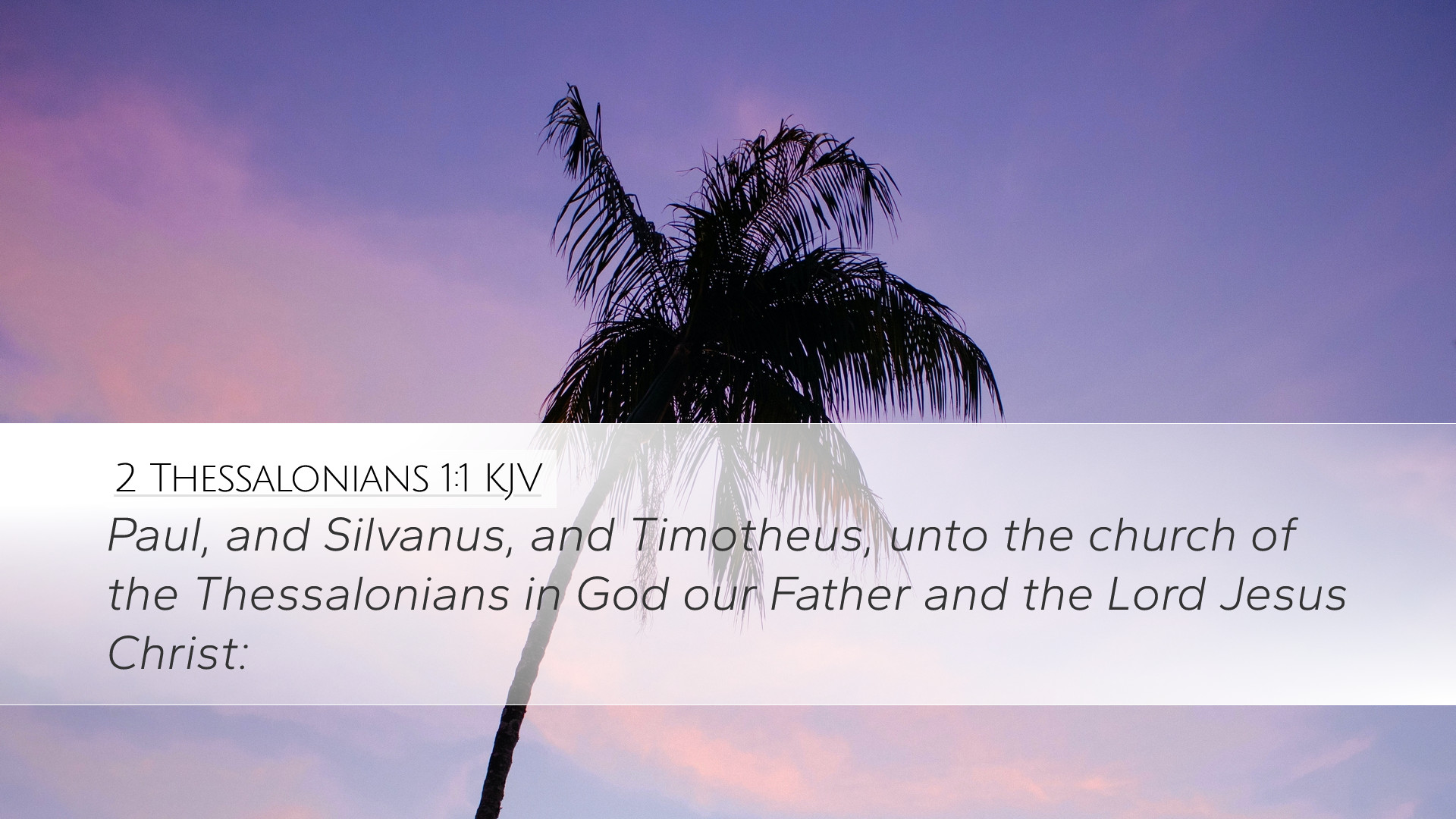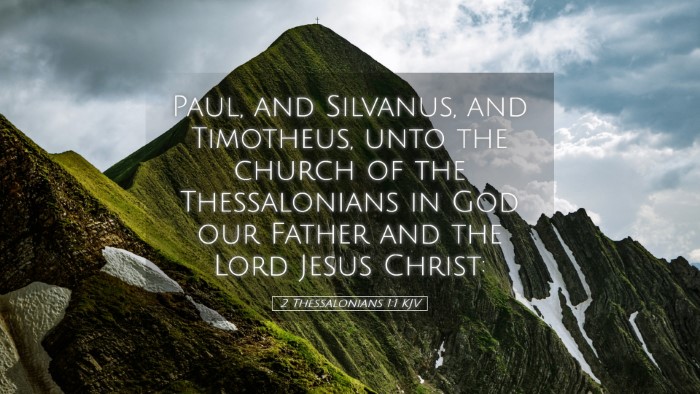Old Testament
Genesis Exodus Leviticus Numbers Deuteronomy Joshua Judges Ruth 1 Samuel 2 Samuel 1 Kings 2 Kings 1 Chronicles 2 Chronicles Ezra Nehemiah Esther Job Psalms Proverbs Ecclesiastes Song of Solomon Isaiah Jeremiah Lamentations Ezekiel Daniel Hosea Joel Amos Obadiah Jonah Micah Nahum Habakkuk Zephaniah Haggai Zechariah Malachi2 Thessalonians 1:1
2 Thessalonians 1:1 KJV
Paul, and Silvanus, and Timotheus, unto the church of the Thessalonians in God our Father and the Lord Jesus Christ:
2 Thessalonians 1:1 Bible Commentary
Commentary on 2 Thessalonians 1:1
Text of 2 Thessalonians 1:1 (KJV): "Paul, and Silvanus, and Timotheus, unto the church of the Thessalonians in God our Father and the Lord Jesus Christ."
Introduction
The Apostle Paul's first letter to the Thessalonians was penned shortly after the founding of the church in Thessalonica during his second missionary journey. By contrast, 2 Thessalonians is his subsequent epistle, written to address issues that had arisen since the first letter. Verse 1 of chapter 1 serves as an introduction, establishing authorship, audience, and the divine authority behind the message.
Authorship: Paul, Silvanus, and Timotheus
1. Paul the Apostle: As the principal author, Paul identifies himself with clarity and authority. His calling as an apostle, marked by direct encounter with Christ, grants him divine credibility. Matthew Henry notes that Paul’s authority stems not from himself but from God, serving as a reminder that the message he conveys is not merely human wisdom but divine revelation.
2. Silvanus (Silas): Silvanus, mentioned alongside Paul, had accompanied him on his missionary journey (Acts 15:40). His inclusion indicates a respected and recognized figure in the early church. Albert Barnes points out that Silvanus likely played a role in writing or helping with the epistle, symbolizing the collaborative nature of early church leadership.
3. Timotheus (Timothy): Timothy is the third co-author named, emphasizing the interdependence of church leaders. Adam Clarke suggests that Timothy's presence signifies mentorship and the continuity of faith among successors of the apostolic leadership. This highlights the early church’s emphasis on community and the guidance of rising leaders.
The Audience: Church of the Thessalonians
The epistle is addressed "unto the church of the Thessalonians," a term that denotes a specific community bound by faith. The church in Thessalonica was established amidst significant persecution and challenges. Matthew Henry points out that this designation, "the church," underscores their collective identity, implying that they are a community in fellowship with God, designed to be distinct in the world.
Theological Implications: According to Barnes, the church signifies more than mere gatherings; it’s the assembly of those called out—ekklesia—by God, chosen to be His own. The inclusion of "in God our Father and the Lord Jesus Christ" connects their identity to the divine, signifying that their existence and unity are grounded in a relationship with the Triune God.
Divine Relationship: In God Our Father
The phrase "in God our Father" has rich theological implications. It emphasizes a profound relationship between believers and God. Paul frames the Thessalonians' identity within the familial context of divine sonship. As Henry notes, this gives believers a sense of belonging and assurance that they are part of God's eternal family, highlighting both His authority and nurturing nature.
Context of Divine Authority: Adam Clarke elaborates that this relationship assures believers of their standing before God, thereby reinforcing their faith against challenges. It provides a foundation that can withstand persecution, emphasizing that they are under the protection and guidance of their heavenly Father.
Unity in Christ
The mention of "the Lord Jesus Christ" reflects the unity of Christ with God the Father, denoting dual aspects of their faith—the significance of the Father and the Lordship of Christ. This reiterates the Christocentric focus of the early church, as underlying themes of the Gospel permeate this address. Barnes notes that by identifying both the Father and Christ, Paul affirms the core Christian belief in the Trinity, essential to understanding the nature of God’s revelation through Jesus.
Pastoral Relevance
This introductory verse offers rich insights for pastors and church leaders today. First, it highlights the importance of a strong network among church leaders, drawing from Paul, Silas, and Timothy's collaborative efforts. Effective ministry often requires teamwork, mentoring, and shared burdens.
1. Leadership Development: The emphasis on Timothy's role encourages current pastors to invest in younger leaders, providing them with opportunities to learn and grow within the context of community. Training leaders in the faith is essential for the church's longevity and vitality.
2. Identity in Christ: Understanding collective and individual identity “in God our Father” is crucial for nurturing a healthy church environment. This sense of identity cultivates resilience amidst external pressure and internal strife, reminding congregants that they belong to a greater divine family.
3. Theological Teaching: This passage also prompts theological reflection on the nature of God and Christ, reminding leaders to teach congregants about the significance of faith in the Triune God, which is essential for building a robust and biblically grounded church.
Conclusion
In conclusion, 2 Thessalonians 1:1 serves as a reminder of the apostolic authority, community identity, and divine relationships central to the life of the Church. The collaborative ministry of Paul, Silvanus, and Timothy provides a model for pastoral leadership, while the foundational truths about God the Father and the Lord Jesus Christ reinforce the essential doctrines of faith. This verse encourages believers to embrace their identity in Christ and live out their faith in a manner befitting the citizens of the heavenly kingdom.


